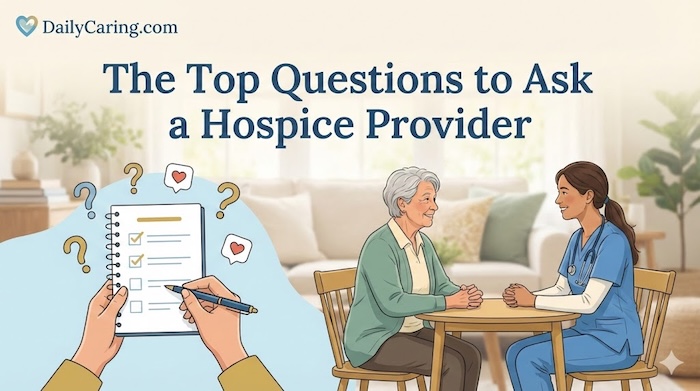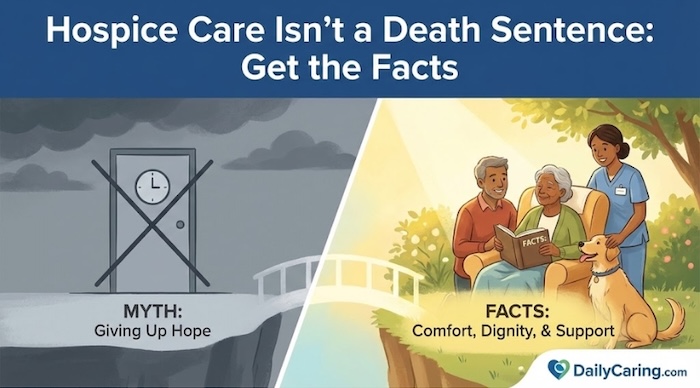These two services are often confused, so it's essential to understand the key differences and benefits of palliative care vs. hospice care.
Depending on their health conditions, one or both of these services could significantly improve your older adult’s quality of life.
We explain the key differences and answer nine common questions about palliative care vs. hospice care.

What's the Difference Between Palliative Care and Hospice Care?
Palliative Care
Palliative care can be used during any stage of a serious illness. It helps seniors and their families cope with the side effects of medical treatments, fears, and caregiver stress.
By relieving symptoms, palliative care often improves someone’s tolerance of medical treatments and recovery.
The palliative care team can also help families make difficult medical decisions, taking time to discuss pros and cons.
This gives seniors and caregivers more control because they'll have a better understanding of treatment choices.
Hospice Care
Hospice care is for patients who are ill enough for a doctor to certify that they may not live beyond 6 months. (That sounds scary, but it doesn’t mean that it’s a death sentence. Get the facts here.)
The main goal is to make your older adult as comfortable as possible.
Hospice uses a combination of pain and symptom management plus emotional and spiritual support for seniors and families.
When your older adult has hospice care, visiting nurses eliminate the need to go to the doctor’s office, and families can even get help with personal care tasks like bathing.
On-call help and support is also available – 24 hours a day, 7 days a week.
9 Top Questions About Palliative Care vs. Hospice Care
1. Who Can Get These Types of Care Options?
Palliative care: Anyone with a serious illness, no matter how long they’re expected to live.
Hospice care: Someone with an illness who may not live beyond 6 months. This doesn’t mean they’re definitely going to die, but they’re sick enough that it could be a possibility.
2. Can Seniors Continue to Receive Treatments to Cure Their Illness?
Palliative care: Yes, seniors could receive palliative care and curative treatments at the same time
Hospice care: Generally no. Hospice focuses on treatments and medicines that relieve symptoms.
3. Is Either Covered by Medicare?
Palliative care: Some treatments and medications may be covered.
Hospice care: Yes, Medicare will pay for hospice care charges.
4. Is Either Covered by Medicaid?
Palliative care: Some treatments and medications may be covered.
Hospice care: In most U.S. states, Medicaid covers all hospice care costs. Check with local hospice companies to make sure.
5. Is Either Covered by Private Insurance?
Palliative care: No. Palliative care services are flexible and based on what your older adult needs, so coverage will depend on what services or treatments they’re using.
Hospice care: Yes, most insurance plans cover hospice care.
6. How Long Can the Care Continue?
Palliative care: It depends on your older adult’s needs and their insurance coverage (Medicare, Medicaid, or private).
Hospice care: As long as your older adult qualifies for hospice.
7. Who Provides the Services?
Palliative care: Hospitals, hospice organizations, skilled nursing facilities
Hospice care: Hospice organizations, hospice programs based out of a hospital
8. Where are These Services Provided?
Palliative care: At home, in an assisted living community, in a skilled nursing facility, in a hospital
Hospice care: Wherever your older adult lives: at home, in an assisted living community, skilled nursing facility, or hospital. Some hospice organizations also have facilities where people can live (hospice residence) or get short-term care for severe pain or symptom management.
9. Is End-of-Life Care Offered?
Palliative care: This depends on the provider. Be sure to ask.
Hospice care: Yes, hospice organizations have end-of-life experts on staff.
Final Thoughts
Navigating the landscape of comfort care can feel overwhelming, but understanding the distinct roles of palliative and hospice care is a decisive first step. Remember, you don't have to wait for a crisis; palliative care can be a source of support right now, while hospice provides dedicated comfort when it's needed most.
You are not alone in asking these questions. We encourage you to take this information to your loved one's doctor and start the conversation. Being proactive is one of the most caring gifts you can give your entire family.
Recommended for you:
- Hospice Myths: 5 Common Misunderstandings
- Choosing a Hospice Provider: Important Questions to Ask
- 5 Questions to Ask Doctors About Tests and Treatments for Seniors
About the Author

Connie is the founder of DailyCaring.com and was a hands-on caregiver for her grandmother for 20 years. (Grandma made it to 101 years old!) She knows how challenging, overwhelming, and all-consuming caring for an older adult can be. She also understands the importance of support, especially in the form of practical solutions, valuable resources, and self-care tips.














My father’s geriatric care manager says that since his medical conditions are under control, there is nothing palliative care can offer him. Is dementia not considered a serious illness and might he benefit from it?
This is a question for your father’s doctor, not a geriatric care manager. Only a qualified medical professional can provide a recommendation about palliative care that’s appropriate for your father’s current health condition.